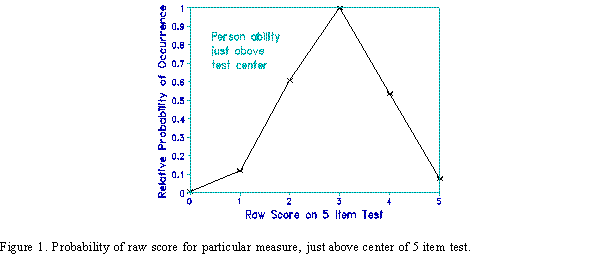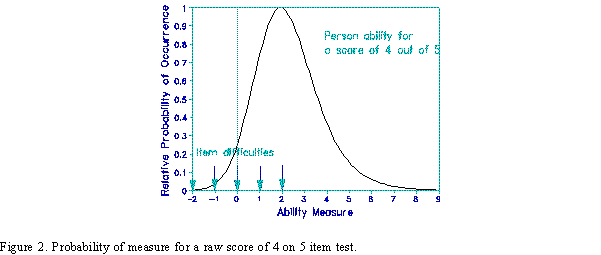
"Obviously, most psychometricians would favor a less straightforward sense of representation, one in which sameness or difference of test scores only indicated sameness or difference of the attribute represented with a specific probability. For example, Rasch's theory of test scores, mentioned in Chapter 1, allows people of the same ability to obtain different scores and people of different levels of ability to get the same score on particular occasions."
Joel Michell (1999) Measurement in Psychology: Critical History of a Methodological Concept. Cambridge: Cambridge University Press. p. 166-7 n.
Can anyone illuminate what he might be after here?
Trevor Bond
Michell is contrasting Rasch models with "error-free" models. In these strictly deterministic models, a latent measure is always observed as a particular score, and a particular score always indicates the same latent measure. Under Rasch model conditions, in contrast, the relationship between measures and scores is probabilistic. Any score can be observed for a particular measure, and any measure can generate a particular score. Figures 1 and 2 illustrate this for a test of 5 uniformly distributed items.
Michell, however, errs when he perceives the Rasch model to be a model of psychological processes, rather than the necessary and sufficient expression of measurement. "If Rasch's hypothesis is correct, the estimates can be regarded as measures of the ability involved. Some psychologists claim to be able in this way to measure intellectual abilities." (p. 12)


Scores and measures. Michell J, Bond T. … Rasch Measurement Transactions, 2000, 14:1 p.731
| Forum | Rasch Measurement Forum to discuss any Rasch-related topic |
Go to Top of Page
Go to index of all Rasch Measurement Transactions
AERA members: Join the Rasch Measurement SIG and receive the printed version of RMT
Some back issues of RMT are available as bound volumes
Subscribe to Journal of Applied Measurement
Go to Institute for Objective Measurement Home Page. The Rasch Measurement SIG (AERA) thanks the Institute for Objective Measurement for inviting the publication of Rasch Measurement Transactions on the Institute's website, www.rasch.org.
| Coming Rasch-related Events | |
|---|---|
| Jan. 16 - Feb. 13, 2025, Fri.-Fri. | On-line workshop: Rasch Measurement - Core Topics (E. Smith, Winsteps), www.statistics.com |
| Apr. 8 - Apr. 11, 2026, Wed.-Sat. | National Council for Measurement in Education - Los Angeles, CA, ncme.org/events/2026-annual-meeting |
| Apr. 8 - Apr. 12, 2026, Wed.-Sun. | American Educational Research Association - Los Angeles, CA, www.aera.net/AERA2026 |
| May. 15 - June 12, 2026, Fri.-Fri. | On-line workshop: Rasch Measurement - Core Topics (E. Smith, Winsteps), www.statistics.com |
| June 19 - July 25, 2026, Fri.-Sat. | On-line workshop: Rasch Measurement - Further Topics (E. Smith, Winsteps), www.statistics.com |
The URL of this page is www.rasch.org/rmt/rmt141b.htm
Website: www.rasch.org/rmt/contents.htm